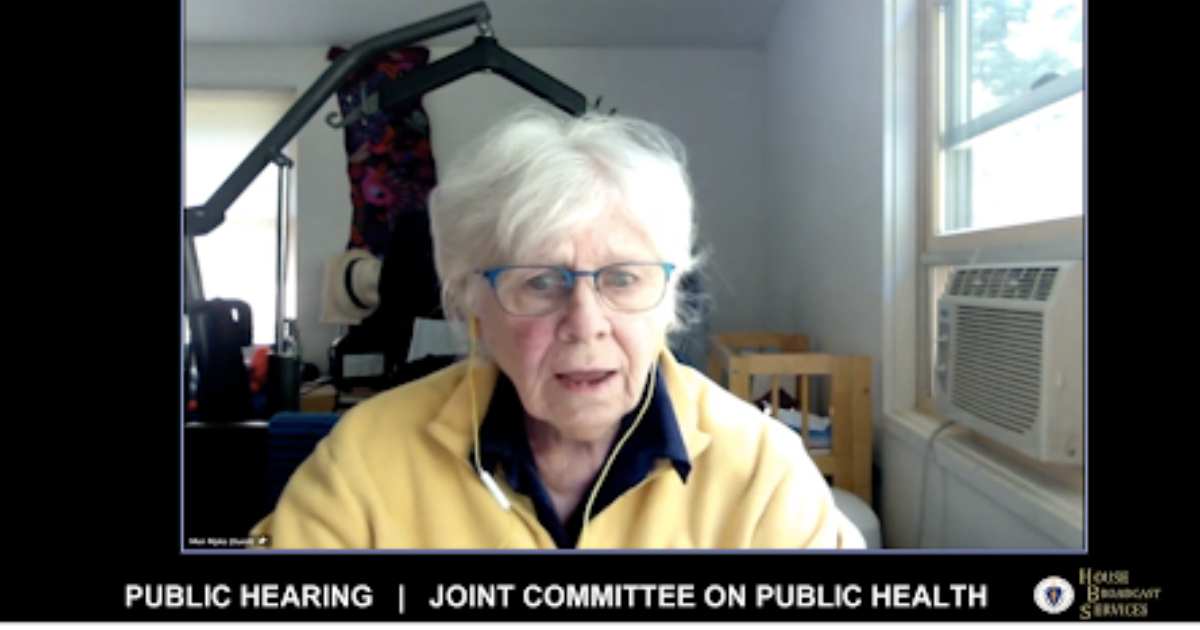Terminally Ill Patients, Caregivers Share Riveting Testimony at Hearing on End of Life Options Act
Lawmakers Hear Tragic Stories of Agonizing Deaths Without the Option of Medical Aid in Dying
Oct 20, 2023 Dr. Roger Kligler

Late ALS patient Meri Myles testifying at Massachusetts hearing in 2021
Dozens of terminally ill patients and caregivers of loved ones who died with unbearable suffering testified at a Friday hearing before the Massachusetts Joint Committee on Public Health to urge the state Legislature to pass the End of Life Options Act (H.2246/S.1331).
Sponsored by Senator Jo Comerford and Representatives James O'Day and Ted Philips, and cosponsored by 80 other lawmakers, the bill would give mentally capable, terminally ill adults to the option to obtain prescription medication they could decide to take to peacefully end intolerable suffering.
“My late wife, Meri Myles, then terminally afflicted with ALS, testified remotely to the Massachusetts Legislature Joint Committee on Public Health to urge consideration and passage of ‘An Act relative to End of Life Options,’” testified Concord resident Mark Myles. “As she predicted, by the time of her death [in December 2022] she was unable to speak or swallow, unable to control her bowels or bladder, unable to gesture or move or communicate, unable to breathe without difficulty, and in pain. She lingered in this state for several weeks — at the end mostly in a coma from painkillers. The prohibition on medical aid in dying is anything but ‘pro-life.’ No — it is pro-suffering, senseless, undignified, inhumane. It is torture.”
Medical aid in dying is authorized in neighboring Vermont and nearby Maine as well as in eight other states: California, Colorado,
Hawai‘i, Montana (via a state Supreme Court ruling), New Jersey, New Mexico,
Oregon, Washington and Washington, D.C.
“Lee loved being alive,” said Gloucester resident Paul Cary Goldberg, whose wife, Lee Marshall, an RN, and he were forced to move 2,000 miles so she could use New Mexico’s Elizabeth Whitefield End-of-Life Options Act to gently end her suffering from metastatic breast cancer that spread to her brain, bones, lungs and liver. “As a nurse for more than 40 years, she cared for many people who suffered terribly in the dying process. Lee didn’t want to linger and suffer in a debilitated, helpless, joyless state. Medical aid in dying was the only option consistent with her values. But that option was not available in Massachusetts, and we were forced to leave home in the last weeks of Lee’s life — an indescribably painful experience. I am still haunted by the anguish and isolation we had to endure at the end of her life.”
Nearly three out of four Massachusetts voters (73%) support the End of Life Options Act, and nearly eight out of 10 voters (79%) support the bill after they learn about its safeguards, according to a March Beacon Research poll. At least seven in 10 voters (70%-75%) in every state region support the bill, as do 79% of Democrats, 71% of unenrolled voters, 68% of Republicans, 89% of strongly pro-choice voters, 68% of moderate pro-choice voters, a plurality of anti-choice voters (47% vs. 43%), 68% of Catholic voters, 71% of Protestant voters, 68% of voters living with a disability, 76% of white voters and 63% of voters of color.
“We all live our personal values, have our personal religious ideals and our personal ethics, all of which make up the foundation of who we are. They make us unique," testified Melissa Stacy, northeast campaign manager for Compassion & Choices Action Network. “Why is it OK for us to live our whole lives by these individual values and not be able to carry those values into how we spend our last days and our death? Terminally ill people who are eligible under this act are dying. Giving them the option to choose when they’ve had enough, to save them from excruciating suffering in their final days, is the compassionate choice."
A 2017 internal survey of Massachusetts Medical Society members showed they support the End of Life Options Act by a 2-1 margin: 62% support vs. 28% oppose (see page 9 chart here).
“Twenty-one years ago, my life changed,” said Falmouth resident Dr. Roger Kligler, who has stage IV metastatic prostate cancer. “I was diagnosed with cancer. I had surgery and radiation, which didn’t cure me. I have done everything to treat my cancer. I am suffering but not wanting to die yet. I don’t want to die bedridden with my bones crumbling; I have seen that. I only ask to have an option to say enough! Is it in the interest of the Commonwealth for me to die with marked suffering and in extreme pain? I think not.”
The use of hospice care among Medicare recipients has more than doubled over the past two decades. Yet studies estimate that nearly 70% of cancer patients who receive low doses of opioids to treat background pain (pain experienced for more than half the waking days during the previous week) still experience severe bouts of breakthrough pain. Cancer is by far the most common diagnosis among terminally ill individuals who qualify for medical aid in dying.
“Her cancer was untreatable,” testified Osterville resident Ron Breteler, referring to his wife of 43 years, Dr. Wendy Nelson, a clinical psychologist. “She spent the final six weeks of her life at home under hospice care … She became increasingly irrational, but during times of mental clarity she asked me to take her to Vermont where she hoped she might be allowed to die peacefully. She also asked me and our kids several times if we could please give her an overdose of morphine. We were torn but knew we could not legally do that, even though we supported her wish to end her suffering. No family should face such a horrible choice! … This bill has been before the Legislature for many years ... I implore you to act.”

